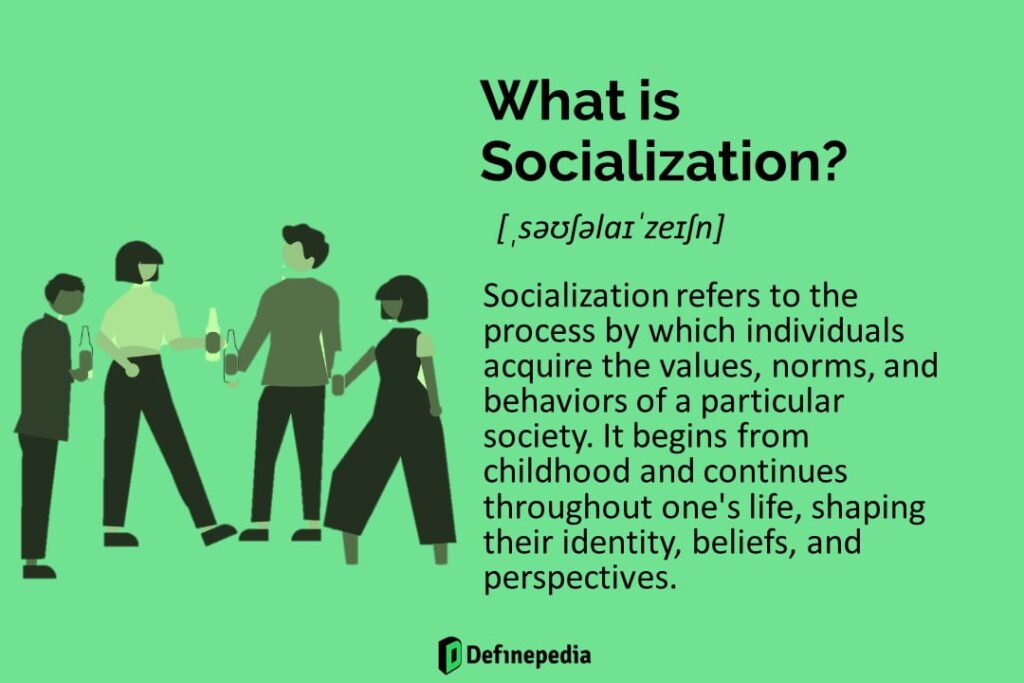Socialization, understanding consumer behavior has become very important for businesses seeking to stay competitive and connect with their target audience. One crucial aspect that significantly influences consumer behavior is socialization. By delving into the realm of socialization and its impact on consumer behavior, we can gain valuable insights into how individuals make purchasing decisions and how businesses can effectively engage with their customers.
Definitions of Socialization
“The process by which individuals learn the norms, values, and behaviors appropriate to their society or group”
Macionis and Plummer
“The process through which people learn to participate in the social world and acquire the skills and knowledge necessary to function in society”
Berger and Luckmann
“The process of learning to take on the roles and statuses of one’s society”
Parsons
“The process of acquiring the knowledge, skills, and attitudes necessary to participate in a society” .
Erickson.
“The process of becoming a member of a group or society”
Goffman
What is Socialization?
Socialization refers to the process by which individuals acquire the values, norms, and behaviors of a particular society. It begins from childhood and continues throughout one’s life, shaping their identity, beliefs, and perspectives. This socialization process plays a vital role in how consumers perceive and interact with brands and products.

Socialization and the Family
Set clear rules and expectations. Children need to know what is expected of them in order to develop self-control. Parents should set clear rules and expectations, and be consistent in enforcing them.
Provide positive reinforcement. When children follow the rules, parents should praise them. This will help children to associate good behavior with positive consequences.
Use time-outs. When children misbehave, parents can use time-outs to help them learn self-control. Time-outs should be short and age-appropriate.
Model self-control. Children learn by watching the adults in their lives. Parents should model self-control by being patient, calm, and respectful.
Be patient. It takes time for children to learn self-control. Parents should be patient and understanding as their children learn to control their emotions and behavior.
The family unit serves as the primary agent of socialization, where individuals develop their initial understanding of the world and its consumer patterns. Family dynamics, including parental influence, sibling interactions, and shared experiences, significantly impact consumer behavior.
To Instill Self-Control
During childhood, the family environment shapes an individual’s self-control and decision-making abilities. Children learn to exercise restraint, delay gratification, and consider the consequences of their choices. These learned behaviors directly influence consumer behavior in adulthood, affecting impulsive buying tendencies and the ability to make informed purchase decisions.
To Instill Values
Families play a pivotal role in instilling values that guide consumer behavior. Through observation and reinforcement, individuals absorb their family’s beliefs and moral compass, which subsequently influence their purchasing choices. For example, if a family values sustainability and ethical practices, individuals are more likely to seek out environmentally friendly products and support socially responsible brands.
To Instill Role Behavior
Family members often fulfill specific roles within the household, which can shape consumer behavior. For instance, parents may take on the role of decision-makers, influencing the purchase choices of other family members. Understanding these role dynamics enables businesses to tailor their marketing strategies and target key influencers within a household.
Socialization and Educational Institutions
Educational institutions, such as schools and universities, serve as crucial socialization agents that further shape consumer behavior. Students are exposed to various influences that mold their perceptions and preferences.
Socialization Impact Consumer Behavior education education educational
Education equips individuals with knowledge, critical thinking skills, and the ability to process information. As students learn about marketing, advertising, and persuasive techniques, they become more discerning consumers. This knowledge influences their decision-making process, leading them to evaluate products based on quality, value, and personal needs.
Educational institutions also foster social interactions among students, exposing them to diverse perspectives and consumer trends. Peer influence and discussions around brands and products heavily impact consumer behavior, often resulting in the adoption or rejection of certain products.
Socialization and Religious Institutions
Religious institutions hold significant influence over consumer behavior, as they provide individuals with a set of beliefs, values, and ethical frameworks. These religious teachings shape how individuals perceive brands and make purchasing decisions.
Religion often emphasizes concepts such as modesty, humility, and ethical conduct. Consumers who adhere to religious teachings may prioritize these values when choosing products or services. Businesses that align themselves with these values and effectively communicate their commitment to ethical practices can build trust and loyalty among religious consumers.
Conclusion
Socialization plays a fundamental role in shaping consumer behavior. By understanding the impact of socialization on individuals’ values, beliefs, and decision-making processes, businesses can develop effective marketing strategies that resonate with their target audience.
To successfully engage with consumers, brands must recognize the significance of the family unit in shaping consumer preferences, the role of educational institutions in fostering critical thinking, and the influence of religious institutions in guiding ethical consumer behavior. By aligning their messaging, values, and offerings with these socialization agents, businesses can build meaningful connections with consumers and drive brand loyalty.
References
“How Socialization Impact Consumer Behavior?” Iedunote, NaN undefined. NaN, https://www.iedunote.com/how-socialization-impact-consumer-behavior. Accessed 19 July. 2023.
Was this helpful?
0 / 0